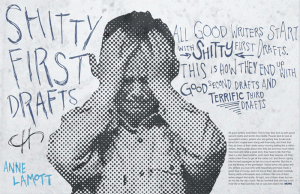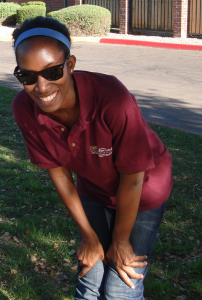Content Coordinator for Poetry and Nonfiction: Ashley Maul
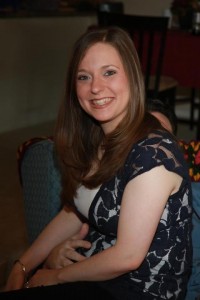 Once, she was asked to list five books she’d bring with her on a deserted island and without fail her answer remains: Harry Potter and the Goblet of Fire, The Scarlet Letter, a collection of Allen Ginsberg’s poetry, To Kill a Mockingbird, and Billy Collin’s The Trouble with Poetry. Her favorite reading reflects her own writing style – a combination of youthful fancy and shenanigans mixed with sarcasm and adult confession.
Once, she was asked to list five books she’d bring with her on a deserted island and without fail her answer remains: Harry Potter and the Goblet of Fire, The Scarlet Letter, a collection of Allen Ginsberg’s poetry, To Kill a Mockingbird, and Billy Collin’s The Trouble with Poetry. Her favorite reading reflects her own writing style – a combination of youthful fancy and shenanigans mixed with sarcasm and adult confession.
Like many students so close to graduation, she is unsure of where the future will take her, but she is very interested in the publishing industry and imagines a career that allows her to telecommute as an editor for a posh literary magazine or book publishing company. With a history in bookstore management and an avid thirst for reading and writing, there is little she can imagine that can combine her interests so perfectly.
Art Editor Arjun Chopra
 Arjun started working with Superstition Review over the past summer as a guest contributor with his blog series, “Dispatches From Delhi.” Despite being relatively new to the world of editing/publishing, Arjun finds his position intellectually stimulating and instrumental in giving him his first glimpse into the actual working side of writing. He finds his work to be a comprehensive learning experience in meshing creativity with professionalism, an invaluable skill of those who strive to make a living through their writing, a skill he is glad to have the chance to practice.
Arjun started working with Superstition Review over the past summer as a guest contributor with his blog series, “Dispatches From Delhi.” Despite being relatively new to the world of editing/publishing, Arjun finds his position intellectually stimulating and instrumental in giving him his first glimpse into the actual working side of writing. He finds his work to be a comprehensive learning experience in meshing creativity with professionalism, an invaluable skill of those who strive to make a living through their writing, a skill he is glad to have the chance to practice.
When not in class, doing homework, or compiling graduate application materials, Arjun enjoys spending his free time reading novels and poetry collections, writing, watching movies, skateboarding, and listening to a wide variety of different music.
Advertising Editor Brooke Passey
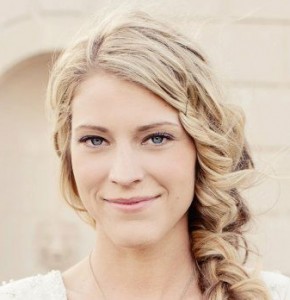 Along with her reading load for class, Brooke tries to read one recreational book a week. To stay motivated she posts weekly book reviews on her blog brookepassey.wordpress.com. She also loves horseback riding and spends her spare time training and teaching riding lessons. In the 15 years that she has been riding she has only fallen off a horse once—when she was reading a book while sitting on her horse bareback. Although she loves both hobbies she has since decided to keep them separate. After graduation she plans on pursuing a career where she can use her writing skills during the day and her riding skills in the evening.
Along with her reading load for class, Brooke tries to read one recreational book a week. To stay motivated she posts weekly book reviews on her blog brookepassey.wordpress.com. She also loves horseback riding and spends her spare time training and teaching riding lessons. In the 15 years that she has been riding she has only fallen off a horse once—when she was reading a book while sitting on her horse bareback. Although she loves both hobbies she has since decided to keep them separate. After graduation she plans on pursuing a career where she can use her writing skills during the day and her riding skills in the evening.
Fiction Editor Abbey Maddix
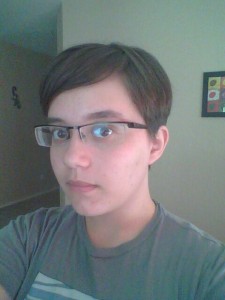 Superstition Review is Abbey’s first experience working with a literary magazine and hopefully the first stepping stone to a career in the editing and publishing world. She finds the position demanding but educational, particularly informative when it comes to thinking about her own future career as a writer. Her work centers on fiction of all forms, exploring genres and forms and her own limitations. She enjoys pushing the boundaries of her comfort zone and enjoys exploring the question “What does it mean to be human?” from both a literary angle and a scientific one.
Superstition Review is Abbey’s first experience working with a literary magazine and hopefully the first stepping stone to a career in the editing and publishing world. She finds the position demanding but educational, particularly informative when it comes to thinking about her own future career as a writer. Her work centers on fiction of all forms, exploring genres and forms and her own limitations. She enjoys pushing the boundaries of her comfort zone and enjoys exploring the question “What does it mean to be human?” from both a literary angle and a scientific one.
On Abbey’s “favorites” bookshelf there are the works of Kurt Vonnegut, Neil Gaiman, Italo Calvino, and Sir Arthur Conan Doyle, although she’d like to expand her experience with contemporary literature. Although she has a difficult time understanding poetry, the works of Pablo Neruda and Tomas Tranströmer have managed to win her over.
 After interning at Superstition Review my freshman and sophomore year, I went on to immerse myself in any (and every) literary outlet I could. From ASU’s State Press Magazine to Lux Undergraduate Creative Review, from the Barrett Chronicle to Every Day Fiction, I applied for, submitted to, reported for, and wrote for just about every publication that I was lucky enough to stumble upon.
After interning at Superstition Review my freshman and sophomore year, I went on to immerse myself in any (and every) literary outlet I could. From ASU’s State Press Magazine to Lux Undergraduate Creative Review, from the Barrett Chronicle to Every Day Fiction, I applied for, submitted to, reported for, and wrote for just about every publication that I was lucky enough to stumble upon.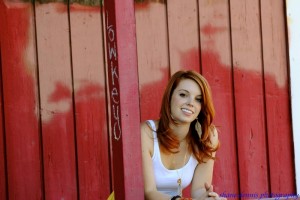
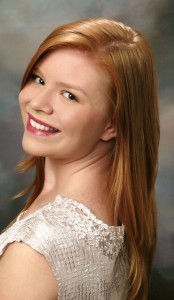 Through her experience with Superstition Review, Carly hopes to gain a firmer sense of an editor’s responsibilities, as well as the skills to fulfill these duties. While she plans to continue writing in many capacities, Carly would also like to help members of the general public to understand the value of written expression and communication, most likely through editorial and teaching positions.
Through her experience with Superstition Review, Carly hopes to gain a firmer sense of an editor’s responsibilities, as well as the skills to fulfill these duties. While she plans to continue writing in many capacities, Carly would also like to help members of the general public to understand the value of written expression and communication, most likely through editorial and teaching positions.
 Harrison owns way too many electronic devices. An avid gamer to the core, Harrison plays World of Warcraft, where his level 85 Holy Paladin protects weaker characters from harm by healing their wounds. His favorite part of these Massively-Multiplayer games is letting the more rude characters die from a lack of healing – his roommates included. Harrison likes to pretend this philosophy does not invade his private life.
Harrison owns way too many electronic devices. An avid gamer to the core, Harrison plays World of Warcraft, where his level 85 Holy Paladin protects weaker characters from harm by healing their wounds. His favorite part of these Massively-Multiplayer games is letting the more rude characters die from a lack of healing – his roommates included. Harrison likes to pretend this philosophy does not invade his private life. Once, she was asked to list five books she’d bring with her on a deserted island and without fail her answer remains: Harry Potter and the Goblet of Fire, The Scarlet Letter, a collection of Allen Ginsberg’s poetry, To Kill a Mockingbird, and Billy Collin’s The Trouble with Poetry. Her favorite reading reflects her own writing style – a combination of youthful fancy and shenanigans mixed with sarcasm and adult confession.
Once, she was asked to list five books she’d bring with her on a deserted island and without fail her answer remains: Harry Potter and the Goblet of Fire, The Scarlet Letter, a collection of Allen Ginsberg’s poetry, To Kill a Mockingbird, and Billy Collin’s The Trouble with Poetry. Her favorite reading reflects her own writing style – a combination of youthful fancy and shenanigans mixed with sarcasm and adult confession. Arjun started working with Superstition Review over the past summer as a guest contributor with his blog series, “Dispatches From Delhi.” Despite being relatively new to the world of editing/publishing, Arjun finds his position intellectually stimulating and instrumental in giving him his first glimpse into the actual working side of writing. He finds his work to be a comprehensive learning experience in meshing creativity with professionalism, an invaluable skill of those who strive to make a living through their writing, a skill he is glad to have the chance to practice.
Arjun started working with Superstition Review over the past summer as a guest contributor with his blog series, “Dispatches From Delhi.” Despite being relatively new to the world of editing/publishing, Arjun finds his position intellectually stimulating and instrumental in giving him his first glimpse into the actual working side of writing. He finds his work to be a comprehensive learning experience in meshing creativity with professionalism, an invaluable skill of those who strive to make a living through their writing, a skill he is glad to have the chance to practice.

